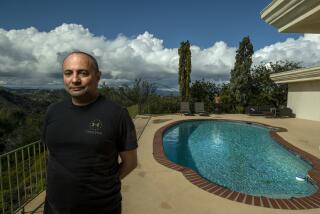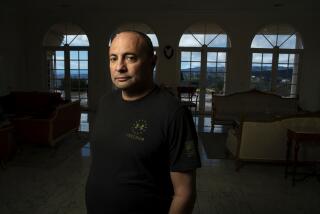A Son Crusades for Mom
As a young man, Chant Yedalian played a role few mothers would wish for their sons.
He helped his cancer-stricken mom pick out a wig, one so convincing that few knew her hair had fallen out from chemotherapy. Every two weeks, he took it to be cleaned. On her lunch hour, he walked her several blocks from her job as director of a church preschool to her breast cancer treatments at Kaiser Permanente’s center in Los Angeles.
Then, on a rainy March day in 1998, he held her hand as Zevart Yedalian heaved her last rattled breath at age 53.
It was the end of her four-year battle with cancer -- and the beginning of Chant’s crusade.
Yedalian, now 29, has been waging a legal battle against Kaiser Permanente ever since. He claims that California’s largest health maintenance organization wrongly denied his mother a potentially life-saving bone marrow transplant. “They killed my mom,” he says.
Kaiser lawyers say the HMO did all it could for Mrs. Yedalian.
The outcome of Yedalian’s lawsuit could have broad implications for Kaiser and other HMOs, according to some consumer advocates and attorneys who are closely following the case. About 1,000 Kaiser members or their families file malpractice claims each year. Nearly all of them are subject to arbitration, a long process that limits awards and tends to benefit health plans.
To get his case moved out of arbitration, Yedalian argued that his mother’s contract with Kaiser did not meet state legal disclosure requirements, meaning that it was not clear she was giving up the right to a jury trial when she enrolled in the plan. “If the position he is asserting prevails in court, it could provide benefit to people in similar situations, anyone in an HMO seeking a way out of arbitration,” says Michael Bidart, a Claremont attorney who was a lead litigator of claims in the Northridge earthquake.
Jamie Court, president of the Foundation for Taxpayer and Consumer Rights in Santa Monica, says that “bottom line, this could mean that a very determined son has found an escape hatch for the private justice system that has never worked appropriately for patients.”
Kaiser officials say that no legal precedent is at stake in the case, and that in any event Kaiser has changed its enrollment forms in recent years. But with 6 million members in California, the HMO isn’t taking any chances. In the last 4 1/2 years, Kaiser has enlisted three major law firms to take on Yedalian and his one-man cause. The suit was filed in Los Angeles County Superior Court in 1999.
In legal trench warfare -- an apt description of Yedalian’s case, with more than 35 volumes of briefs now piled up -- the eventual winner almost always has the bigger law firm and the resources to outlast and outmaneuver the opposition. But occasionally, such circumstances can be overcome by one impassioned individual.
Yedalian was a college student at UCLA when his fight with Kaiser began. He knew nothing about HMOs at first but learned as he put thousands of miles on his Toyota pickup, driving up and down the state hunting documents from insurance and government offices. He got help from a lawyer, paying him with money that he earned by making kitchen cabinets.
Then Yedalian did something extraordinary: He went to Loyola Law School in Los Angeles so he could handle the case himself. He took courses in insurance law and consumer protection. And in May 2002, he graduated in the top 25% of his class. He passed the bar exam a couple of months later and was hired by personal injury firm Cheong, Denove in Santa Monica, where he spends half his time on the Kaiser complaint.
The suit doesn’t specify the amount of damages being sought. “It’s not about the money; it’s that I have to do it,” Yedalian says. He made a promise to his dying mother that he would sue Kaiser and not give up until he won, he says. “Sometimes you feel like you want to explode, but you have to keep cool. I turn those feelings right back at them.”
Yedalian looks back on the last decade and sees only his mother and the case. The curtains in his office are drawn, its walls bare, save for one yellow sheet with his court calendar. Boxes of documents and loose papers, briefs, letters and law journals are strewn everywhere, on the floor, on top of the couch. There are no pictures on his desk, no trinkets from memorable vacations, nothing except his work papers.
Most of his close friends have disappeared because he hasn’t had time for them. Except for a couple of months in 2000 when there was a lull in the case, he hasn’t had a date in the last 10 years. On New Year’s Eve, Yedalian says, he went to bed early after a rare dinner out with a friend, and the next day he was back in the office, working until 10 p.m.
Yedalian knows that some see his quest as a foolhardy drive by a grief-stricken son who is unable to let go or move on. When he feels as if he can’t go on, he sometimes wears a Mighty Mouse cartoon T-shirt under his business suit. The fight already has consumed his youth, and it is still possibly years away from resolution.
His father, Varoujan Yedalian, not only grieves for his lost wife but worries about his selfless son as well. In the small apartment that they share in La Crescenta, the elder Yedalian sometimes wakes up in the wee hours and sees his son sitting at the dining table and pondering the case.
“I believe he has to do this to be happy,” says the 63-year-old Yedalian, a furniture craftsman who with his wife and then-5-year-old Chant emigrated from war-torn Beirut in 1979. “He was very near to his mom,” he adds. “His mom was everything for him.”
Yedalian’s mother, Zevart, a name that means “joyous” in Armenian, was diagnosed with advanced breast cancer in May 1994. She started chemotherapy the following year and responded well to the treatment. At the same time, she hoped that she would be accepted for a special bone marrow transplant plus high-dose chemotherapy -- a risky, experimental and expensive procedure.
As it does now, Kaiser in Southern California then referred all such candidates to City of Hope, the renowned cancer hospital in Duarte. To be accepted, Yedalian’s suit alleges, Kaiser patients needed a 55% score on a heart-function test known as a MUGA scan, which measures a patient’s ability to tolerate the procedure. Zevart Yedalian scored 53% and was rejected.
Yedalian alleges that nearly all other U.S. hospitals that offered the treatment had a MUGA requirement of 50%, and that Kaiser inflated the qualifying criteria so it could deny treatment to patients and thus save millions of dollars. Yedalian alleges that Kaiser didn’t disclose its higher qualifying criteria to his mother and other breast cancer patients or tell them that they might qualify for the same procedure at other hospitals such as UCLA Medical Center.
Kaiser contends that women were rejected for the bone marrow transplant for various reasons, not just the MUGA results. In Mrs. Yedalian’s case, Kaiser points out that the patient delayed seeking treatment for several months, which worsened her condition. Kaiser attorneys further argue that the HMO had no legal obligation to tell patients they could have qualified for such treatments elsewhere or that other hospitals required only a 50% MUGA score.
“From Kaiser’s perspective, we did everything we could for the patient,” says Lawrence Cox, of Arnold & Porter in downtown Los Angeles, one of two outside firms currently working on the case for Kaiser. “From our perspective, City of Hope did everything it could for the patient.” Mrs. Yedalian probably would not have survived the bone marrow therapy, Cox says. “The cure could have been worse than the disease.”
Their strategy is “to wear you down,” Yedalian says of his opposition. “They will paper you and hope you can’t keep up.”
Cox says the same thing about Yedalian: “He’s always filing something.” Cox remembers how Yedalian, even before he became a lawyer, would sit in the back of the courtroom during hearings, diligently taking notes and making hand motions to his attorney. “Chant’s very smart, very focused,” he says, putting his hand up to his eyes to imitate a racehorse with blinders on. “But these allegations are totally without merit.”
Last year, Yedalian got a boost when Los Angeles County Superior Court Judge Anthony J. Mohr fined Kaiser $15,000 for failure to produce certain documents.
In October, Mohr also ordered City of Hope to supply records about other Kaiser breast cancer patients, lashing out at its attorneys for ignoring a subpoena. “If I could sanction you, I would sanction you so hard you would have to have a fundraiser to pay for it,” he told them. An attorney for City of Hope, which isn’t named as a defendant in the lawsuit, wouldn’t comment on the case.
John Rowell, a partner at Yedalian’s firm who is helping him in the lawsuit, calls Yedalian “an Armenian Ralph Nader.” Rowell hired Yedalian shortly after he graduated from law school, seeing both the potential in the case and the fire in Yedalian’s eyes.
“Kaiser has created a real monster here,” says Rowell, a product liability attorney. “Chant is going to bite them ... and never let go.”
Those who know Yedalian aren’t surprised at his drive.
His father says his son’s sense of justice appeared at an early age, recalling an incident when Chant was in high school. Chant had heard that some friends planned to take off the hinges from the principal’s door, and he persuaded them against it.
“Always, Chant does not accept wrong things, only the right,” Varoujan Yedalian says. “If he sees something wrong, always he avenges them.”
And nothing was more devastating to him than the loss of his mother. When he learned that his mother had cancer, Yedalian left the dorm at UCLA and moved back home to take care of her. “We were the best of friends,” he says. After she died, he visited her grave in Hollywood Hills every Sunday for more than three years. He stayed about 30 minutes and brought his mother’s favorite flowers. “I don’t know what they’re called; she would know that,” he says.
Yedalian admits that it’s been a long and lonely struggle. But he says that when he grows weary he thinks about the strength that his mother maintained throughout her long fight.
At the Rose and Alex Pilibos, Mary Postoian Armenian Preschool where Zevart Yedalian worked, people say they had no idea there was something seriously ailing her. Even when nausea got the better of her, she told them she had stomach troubles.
“We never knew she had cancer,” says Takouhey Saatjianv, who took over Zevart Yedalian’s job. “She worked until her last breath to give the best for our children.”
Yedalian says he dwells on the case even when he’s asleep. Once, he claims, he saw a document in a dream, a legislative finding in a state bill that would help bolster an argument to move the complaint out of arbitration. He looked up the document the next day, he says, and to his surprise, it existed.
Theresa Brunasso, Yedalian’s dinner partner on New Year’s Eve, is one of his friends who has stayed with him. She seems to understand what his quest is about. His mother’s last gift to her son, she says, was that of a career path.
“The candle has never failed, the light has never gone out,” says Brunasso, a consultant in human resources. “This is his life’s passion.”
More to Read
Inside the business of entertainment
The Wide Shot brings you news, analysis and insights on everything from streaming wars to production — and what it all means for the future.
You may occasionally receive promotional content from the Los Angeles Times.










